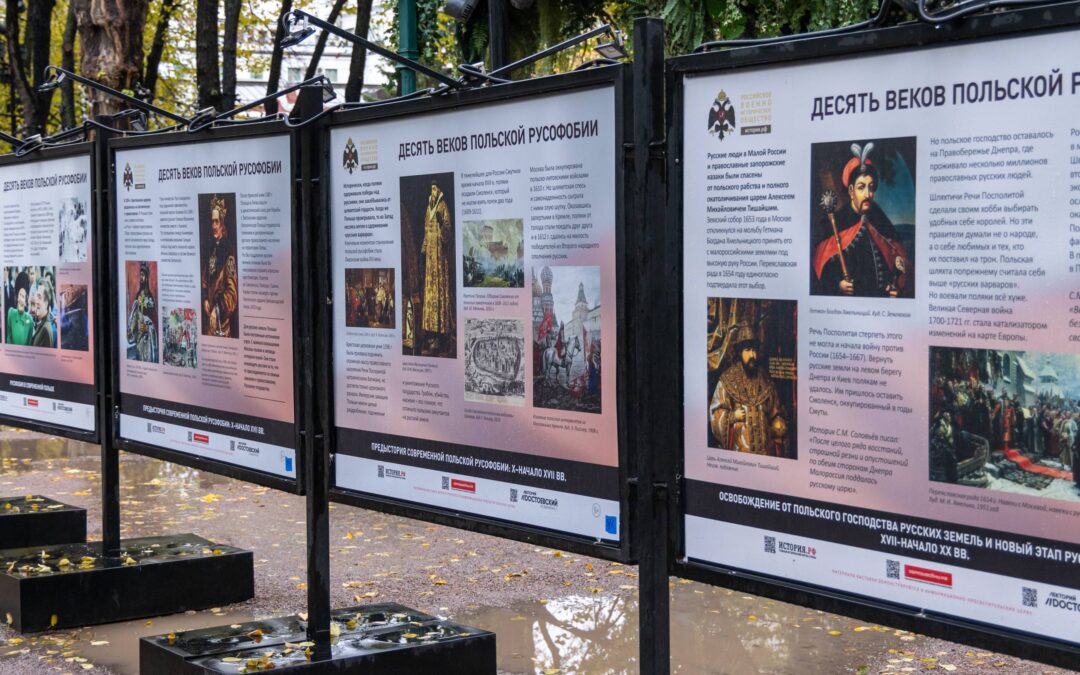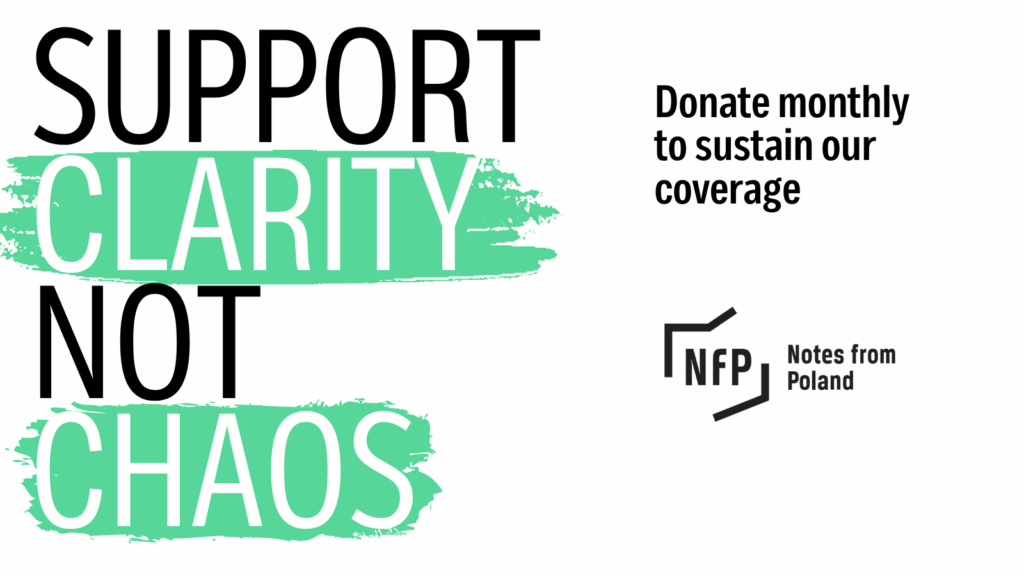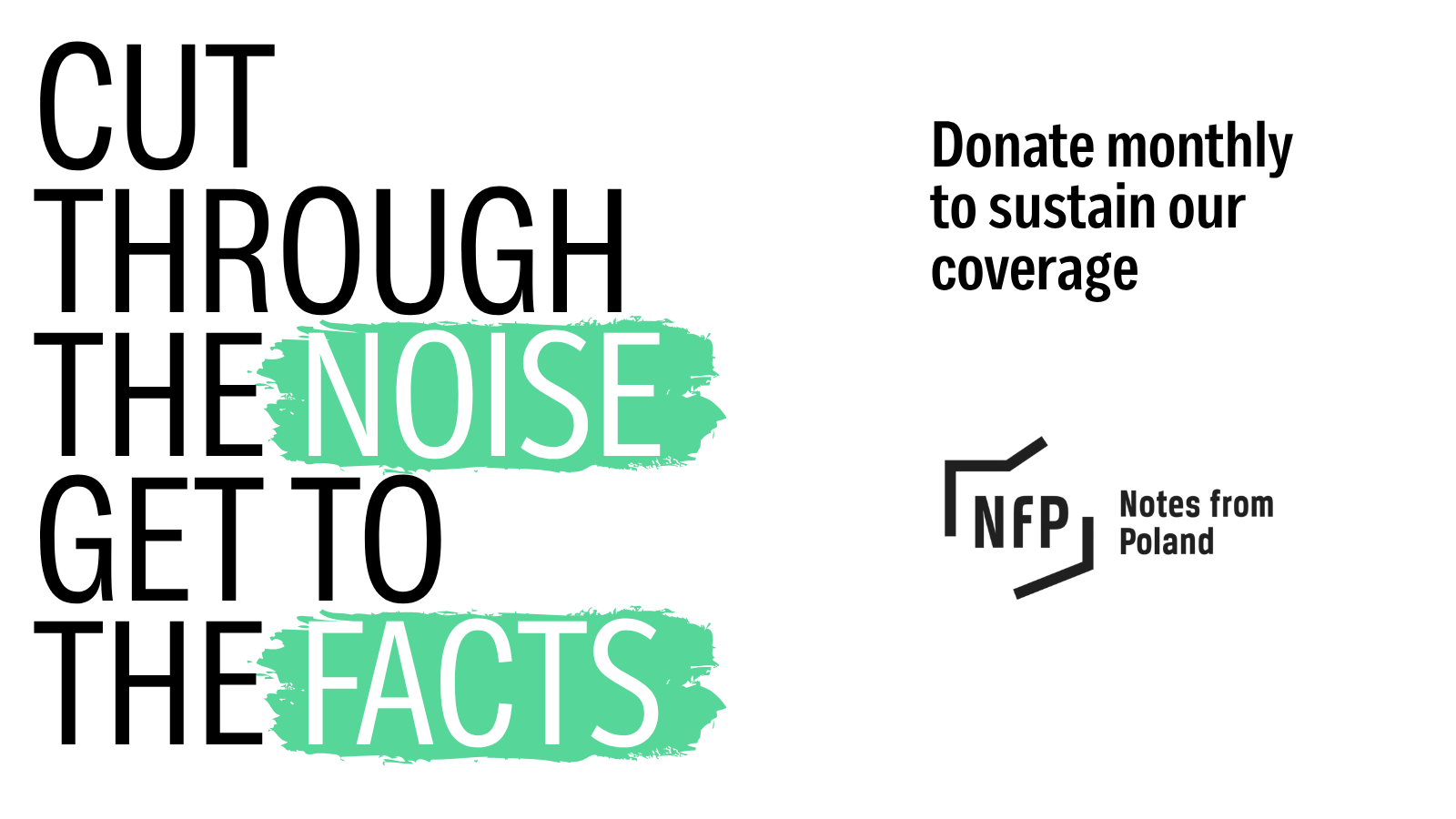Keep our news free from ads and paywalls by making a donation to support our work!

Notes from Poland is run by a small editorial team and is published by an independent, non-profit foundation that is funded through donations from our readers. We cannot do what we do without your support.
A new exhibition titled “Ten Centuries of Polish Russophobia” has opened in Moscow, organised by a Kremlin-linked historical society.
As well as accusing Poles of longstanding and unjusified anti-Russian sentiment, the display presents a revisionist view of history in keeping with the Kremlin’s narrative – but in contradiction to established historical facts.
That includes downplaying Soviet responsibility for the Katyn massacres, in which 22,000 Polish military officers and members of the intelligentsia were executed during World War Two.
«Десять веков польской русофобии»: в Москве открыли выставку с пропагандой против Польши под руководством Владимира Мединскогоhttps://t.co/tAox9VHDeD
— Вот Так (@vottak_tv) October 13, 2025
The exhibition opened on Monday on Gogolevsky Boulevard in central Moscow. It was organised by the Russian Military Historical Society (RMHS), which was established in 2012 by Vladimir Putin to “counter attempts to distort Russian history” and which is overseen by the defence and culture ministries.
“The exhibition is dedicated to the question of why Russophobia has become the foundation of Polish political consciousness today,” said RMHS’s academic director, Mikhail Myagkov.
His organisation also suggest the exhibition will show how “the origins of modern neo-Nazism in Poland are deeply rooted in history”. In actual fact, neo-Nazism is a completely marginal phenomenon in Poland, and the country has strict laws against the promotion of Nazi or other fascist ideologies.
Vot Tak, a Russian-language news service operated by Belsat, which is owned by Polish state broadcaster TVP, notes that the exhibition “reiterates fake news and Russian propaganda narratives”.
According to the RMHS, for example, the exhibition presents evidence that “a German trace is evident” in the Katyn massacres despite Polish claims that “only the Russians are to blame” for the killings.
When evidence of the massacres first came to light in 1943, the Soviets blamed them on Nazi Germany, a position Moscow maintained until the 1990s, when it finally admitted responsibility for the crime. However, in recent years, Russia has begun to move back towards its former position.
Poland's @ipngovpl has criticised Russian plans to remove Polish symbols from the Katyn cemetery, where thousands of Poles killed by the Soviets are buried
"Any country wishing to call itself civilised ought to treat burial sites as sacred and inviolable" https://t.co/giVfE4zXz5
— Notes from Poland 🇵🇱 (@notesfrompoland) August 13, 2025
Another section of the exhibition focuses on Poland’s recent policy of removing dozens of communist-era monuments honouring the Red Army, whose “soldiers died liberating Poland”, in the words of the RMHS. “These actions can be explained solely by Russophobia,” it adds.
Poland, however, does not see Soviet actions in 1944-45 as a liberation, however, given that they resulted in further decades of brutal communist rule imposed by Moscow. It removes Red Army monuments in order to eliminate symbols of totalitarian rule from public spaces.
Some parts of the exhibition also look at events since Russia’s “special military operation” in Ukraine in 2022, including making the false claim that Poland wants to occupy western Ukraine, which was Polish territory before World War Two. Warsaw has expressed no such intention.
Poland has removed another Soviet monument – the 41st since Russia's invasion of Ukraine.
Hundreds of local residents gathered to watch it being demolished, with many applauding as it collapsed https://t.co/KZ21qBfxMn
— Notes from Poland 🇵🇱 (@notesfrompoland) July 23, 2024
The exhibition also covers earlier periods of Russian-Polish relations. A display on the 1919-1921 Soviet-Polish War describes Poland as “an instrument of western aggression against Russia”.
Józef Piłsudski, the leader of the newly independent Polish state established in 1918, was “a German protégé, [who] believed that the Poles should march to Moscow and write on the Kremlin walls, ‘Speaking Russian is forbidden’,” said Myagkov.
“Today we see that Polish political leaders are continuing Piłsudski’s policy, guided by the old slogan: ban everything Russian,” he added. “Successive rulers of the country only speak negatively of Russia.”
“They’ve surrendered their territory to NATO. They’re preparing a war against us. And Poland itself is initiating this conflict,” he continued, adding that “only a victory” in Ukraine will “slow this Russophobic trend in Poland”.
Poland’s government has published a list of ten lies told by Vladimir Putin during his interview with Tucker Carlson, in particular regarding Polish and Ukrainian history.
The speaker of Poland's parliament said Carlson had acted as Putin's "useful idiot" https://t.co/AkUEgb2x1h
— Notes from Poland 🇵🇱 (@notesfrompoland) February 10, 2024
A 2022 poll by the Pew Research Center found that only 2% of Poles hold a favourable view of Russia, which was the lowest figure among all countries it surveyed. Poland’s political leaders are also almost universally critical of Russia.
However, such criticism has come in response to Russian aggression against Ukraine, as well as other countries such as Georgia. Recent years have also seen the Polish authorities uncover numerous espionage and sabotage operations orchestrated by Russia in Poland.
In response to those developments, Poland has significantly ramped up defence spending and other security measures. However, it emphasises that such policies are defensive in nature, and no Polish government has expressed any intention of attacking Russia or sending troops to Ukraine.
At the time of writing, there had been no official response from Poland to the new exhibition in Moscow.
Poland has announced the closure of Russia's consulate in Kraków in response to evidence Moscow was behind the fire that destroyed Warsaw's largest shopping centre.
It is the second Russian consulate closed as retaliation for Moscow's sabotage campaign https://t.co/p77JEhNn7u
— Notes from Poland 🇵🇱 (@notesfrompoland) May 12, 2025

Notes from Poland is run by a small editorial team and published by an independent, non-profit foundation that is funded through donations from our readers. We cannot do what we do without your support.
Main image credit: RMHS (press materials)

Alicja Ptak is deputy editor-in-chief of Notes from Poland and a multimedia journalist. She has written for Clean Energy Wire and The Times, and she hosts her own podcast, The Warsaw Wire, on Poland’s economy and energy sector. She previously worked for Reuters.





















